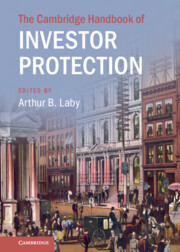Book contents
- The Cambridge Handbook of Investor Protection
- The Cambridge Handbook of Investor Protection
- Copyright page
- Dedication
- Contents
- Contributors
- Acknowledgments
- Introduction: Continuity and Change in Investor Protection
- Part I Institutionalization and Investor Protection
- Part II The Scope of Investor Protection Regulation
- 6 Retirement Plan Reforms in the Absence of a Retirement Policy
- 7 Rogue Brokers and the Limits of Agency Law
- 8 Protecting Investors of Collective-Investor Trusts in China
- 9 Jurisdiction and Applicable Law in Investor Suits
- Part III The Regulation of Market Professionals
- Part IV Alternative Regulatory Regimes
- Index
7 - Rogue Brokers and the Limits of Agency Law
from Part II - The Scope of Investor Protection Regulation
Published online by Cambridge University Press: 20 October 2022
- The Cambridge Handbook of Investor Protection
- The Cambridge Handbook of Investor Protection
- Copyright page
- Dedication
- Contents
- Contributors
- Acknowledgments
- Introduction: Continuity and Change in Investor Protection
- Part I Institutionalization and Investor Protection
- Part II The Scope of Investor Protection Regulation
- 6 Retirement Plan Reforms in the Absence of a Retirement Policy
- 7 Rogue Brokers and the Limits of Agency Law
- 8 Protecting Investors of Collective-Investor Trusts in China
- 9 Jurisdiction and Applicable Law in Investor Suits
- Part III The Regulation of Market Professionals
- Part IV Alternative Regulatory Regimes
- Index
Summary
Rogue brokers – securities-market professionals who defraud their clients, execute unauthorized transactions, or otherwise betray the trust necessarily reposed in them – constitute a relatively small but nonetheless persistent cohort in the securities industry. Likewise persistent is recidivism; fired by one firm, many rogues move on to join another firm in the industry. Repeated into a pattern, this sequence lessens the deterrent effect of firing on future misconduct; and prior misconduct is a good (but not perfect) predictor of future misconduct in this setting. When future misconduct occurs, it may stem from the employer’s failure to discharge its duties to supervise its personnel. Over time a distinct cohort of firms appears to welcome rogues, differentiating themselves from other firms providing comparable services to investors. Likewise, over time at least some rogues and their firms elude regulatory responses. The risk of harm that rogues create is externalized to their clients and customers, and, more indirectly, to the reputation of the securities industry as a whole1 and the credibility of its regulators.
- Type
- Chapter
- Information
- The Cambridge Handbook of Investor Protection , pp. 134 - 152Publisher: Cambridge University PressPrint publication year: 2022

